
Moving to Mexico as an American is easier than you think. With options like residency visas, dual citizenship, and retirement pathways, U.S. citizens can relocate affordably, safely, and legally according to the US State Department, whether through family ties, marriage, or financial solvency. Here's exactly how to do it.
Relocating south of the border depends on your unique situation:
- U.S.-born children of Mexican parents can qualify for nationality automatically, but often need paperwork corrections.
- Adults reclaiming heritage means U.S. citizens with Mexican parents or grandparents restoring nationality.
- Parents registering U.S.-born kids seek dual nationality for education, travel, or inheritance benefits.
- Spouses of Mexican citizens can apply for residency without meeting financial requirements.
- Retirees and expats are drawn by affordability, healthcare, and property ownership.
Doble Nacionalidad Express has helped thousands of families, spouses, and retirees navigate these exact paths. Whether correcting documents, bypassing long consulate waits, or securing residency, we simplify a process that often overwhelms first-timers.
Below, we'll break down everything step by step: visas, costs, lifestyle, property, safety, and citizenship. If you're ready to see how moving to Mexico works in practice, keep reading.
Can a U.S. Citizen Move to Mexico?
Yes, and no. U.S. citizens can enter Mexico without a visa and stay for up to 180 days as a tourist. That means you can travel, rent short-term housing, and explore life in Mexico freely.
But once you cross that six-month mark, you'll need a legal residency path to stay long-term.
Temporary Residency (1-4 Years)
The most common route is the Temporary Resident Visa, valid for one year and renewable up to four years. To qualify, you must show financial solvency, usually around $3,000 USD per month in income or $50,000+ in savings, though requirements vary by consulate.
Permanent Residency
After four years on temporary status, most people qualify for Permanent Residency, which gives you the right to live and work in Mexico indefinitely. Some applicants, especially those with Mexican parents, children, or spouses, can skip temporary residency and qualify directly for permanent status.
Marriage Route
Spouses of Mexican citizens have a much easier process. Unlike other applicants, they do not need to prove income or savings.
Instead, the marriage itself is the basis for residency, and within a few years, many spouses qualify for citizenship.
Do You Lose U.S. Citizenship?
A common misconception is that moving to Mexico means you must renounce your U.S. citizenship. That's not true.
The U.S. allows dual nationality, so you can hold both passports, enjoy full rights in Mexico, and keep your U.S. legal status intact.
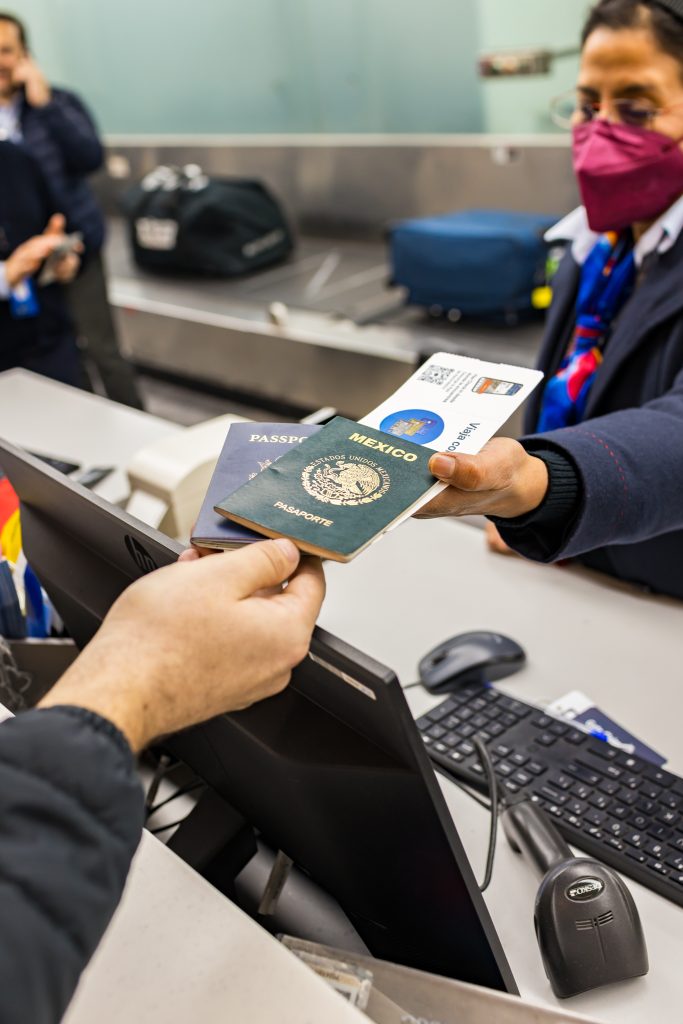
How Much Money Do You Need to Move to Mexico?
One of the first questions Americans ask is, “How much money do I need to move to Mexico?” The answer depends on your path to residency and your lifestyle expectations.
Financial Solvency Requirements for Residency
If you're applying for a Temporary Resident Visa, you'll usually need to show financial solvency requirements:
- Around $3,000 USD in monthly income for the last six months, or
- Around $50,000 USD in savings or investments over the past 12 months.
Each consulate sets its own thresholds, so requirements may vary slightly. For family-based applications (like spouses or children of Mexican citizens), these financial rules often don't apply.
Cost of Living in Mexico
The cost of living in Mexico is significantly lower than in the U.S., making it possible to live comfortably on a modest income according to OECD economic data.
For example:
- $2,000/month: Enough for a comfortable lifestyle in most cities.
- Rent in Mexico City: About $800/month for a one-bedroom apartment.
- Groceries: Around $250 per person per month.
- Utilities and Internet: About $80-100/month combined.
Can I Live on $2,000 a Month in Mexico?
Yes. Many expats live well on $2,000/month, especially outside Mexico City or tourist-heavy beach towns.
Retirees and remote workers often find their U.S. income stretches much further, covering not only essentials but also travel, dining out, and private healthcare for retirees.
Unique Insight
Some newcomers overestimate the financial barriers. If you qualify through marriage or family heritage, you may not need to meet solvency requirements at all.
This can dramatically simplify the move for spouses, children, and descendants of Mexican nationals.
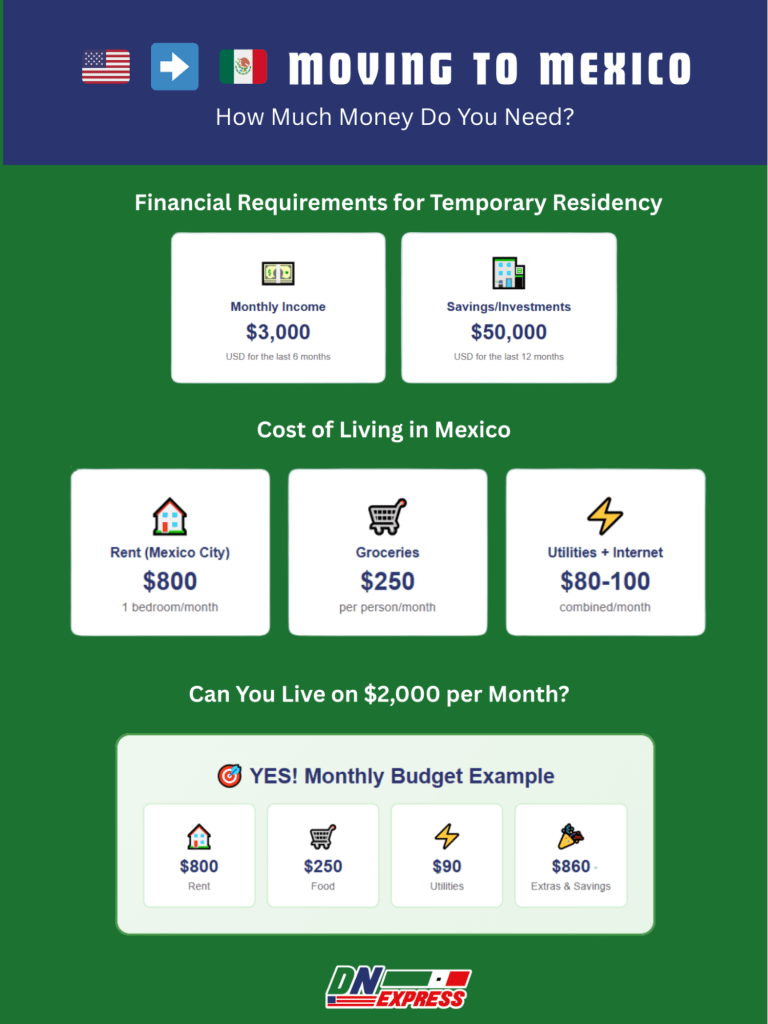
What's Life Really Like for Americans in Mexico?
Moving to Mexico extends beyond visas and finances; it concerns daily life. Most Americans find Mexico vibrant, welcoming, and affordable, but there are also cultural and practical differences to prepare for.
Cost of Living and Lifestyle Adjustments
For many Americans, the biggest draw is the lower cost of housing, healthcare, and groceries compared to the U.S. A modest income stretches much further, allowing retirees and remote workers to enjoy comforts they couldn't afford back home.
That said, life's not always seamless. In rural or less-developed areas, you may face unreliable Wi-Fi, power outages, or water shortages.
Adapting means having backup plans and embracing a slower pace of life.
And while English is widely spoken in tourist zones, learning Spanish is vital for long-term integration. Without it, newcomers often feel isolated, limiting friendships, job opportunities, and community trust.
Reality check: Mexico isn't an all-inclusive resort; it's everyday life. The more effort you put into adapting, the more rewarding your experience will be.
Safety and Best Cities
Safety is a common concern, but experiences vary widely by region according to international quality of life indices. Popular expat hubs like Mérida, San Miguel de Allende, Querétaro, and Guadalajara are often praised for their security and community atmosphere.
- Mérida is consistently ranked the safest city for Americans, offering colonial charm, strong infrastructure, and a growing international community.
- Mexico City, while cosmopolitan and full of opportunity, requires street-smart awareness. Like any major city, some neighborhoods are safer than others.
Question Answered: What is the safest city in Mexico for Americans? Mérida almost always tops the list.
Where Most Americans Live
Americans have built thriving communities across Mexico, choosing locations based on climate, lifestyle, and affordability.
The most popular expat destinations include:
- Mexico City: A cultural capital with endless opportunities.
- Playa del Carmen: Beach lifestyle, digital nomad hotspot.
- Mérida: Safe, family-friendly, and rich in tradition.
- Ajijic (Lake Chapala): A retiree haven with mild weather.
Why are Americans moving to Mexico?
- Lower cost of living.
- Affordable healthcare.
- Cultural connection for those with Mexican heritage.
- Geographic proximity to the U.S., making visits home simple.
Can U.S. Citizens Buy Property in Mexico?
Yes, U.S. citizens can legally buy property in Mexico. Many expats purchase homes, condos, or land, but there are key rules to understand before making an investment.
The Coastal and Border Zone Rule
Foreigners cannot directly own property within 31 miles of a coastline or 62 miles of an international border. Instead, purchases in these areas must be done through a bank trust, known as a fideicomiso.
With this arrangement, the bank holds the title on your behalf, but you have full rights to sell, lease, or pass the property to heirs.
Rent Before You Buy
Even outside restricted zones, most relocation experts recommend renting first. This gives you time to understand neighborhoods, compare costs, and avoid rushing into a deal.
Many expats regret buying too quickly, only to realize they preferred a different city or community.
Protecting Yourself from Scams
One of the biggest concerns for newcomers is unreliable contracts or shady real estate agents. Stories of foreigners being pressured into bad deals are not uncommon.
That's why having legal representation and document review is vital before signing anything. A qualified attorney ensures your title is clean, your contract is enforceable, and your investment is secure.
Pro Tip: If you're not yet ready to buy, a long-term rental is a safe way to test life in Mexico without locking yourself into a property.
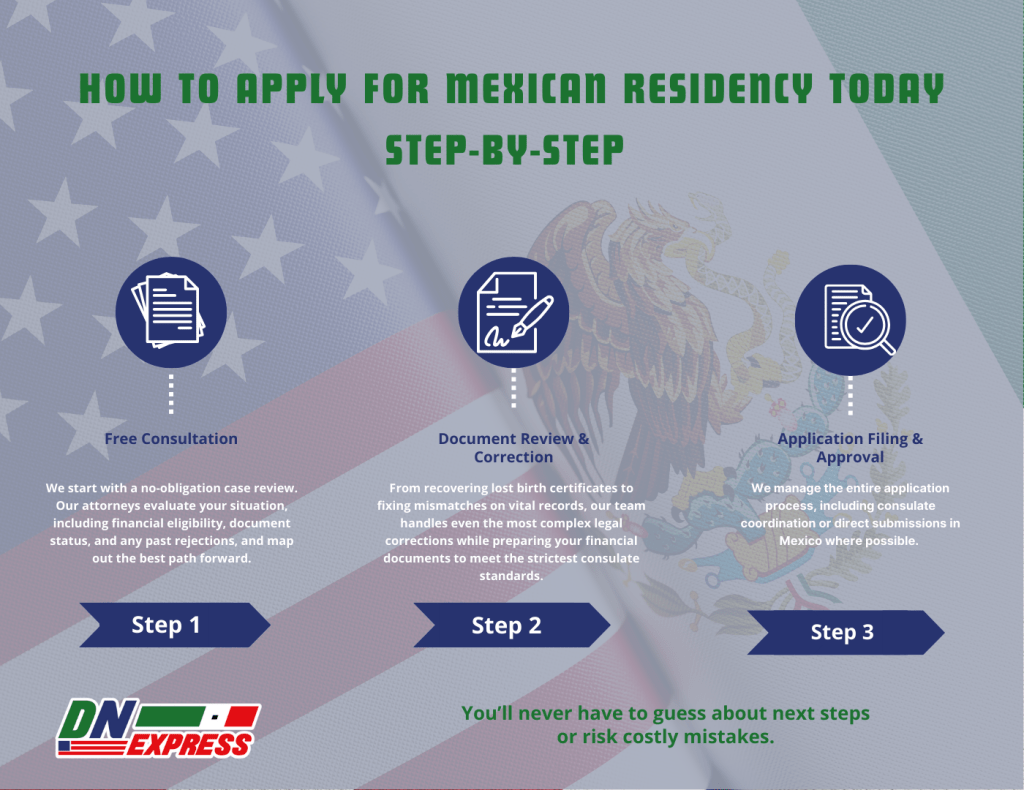
Do You Lose U.S. Citizenship by Moving to Mexico?
No, moving to Mexico does not mean giving up your U.S. citizenship.
The United States allows dual nationality, which means you can hold both passports, enjoy full rights in Mexico, and still keep your U.S. status.
Keeping Your U.S. Passport and Rights
As an American in Mexico, you don't lose access to U.S. benefits like Social Security, Medicare (once back in the U.S.), or the ability to vote in federal elections. You'll simply be living abroad while retaining all your U.S. legal rights.
Tax Responsibilities Don't Disappear
One key point many people overlook: the U.S. taxes worldwide income. Even if you move permanently, you'll still need to file U.S. tax returns.
Depending on how you earn your income, you may also need to comply with Mexican tax laws, especially if you're working locally or owning a business.
Practical Tip: Maintain a U.S. Address
Many expats keep a virtual U.S. mailbox to simplify life abroad.
This helps with:
- Renewing a U.S. driver's license.
- Keeping U.S. bank accounts and credit cards active.
- Maintaining voter registration.
- Receiving legal or government mail.
This small step prevents many of the banking and bureaucratic headaches that can frustrate first-time expats.
Visas, Residency, and Citizenship Pathways
If you're planning to live in Mexico beyond the 180-day tourist allowance, you'll need to apply for legal residency through Mexico's National Immigration Institute or citizenship pathway. The right option depends on your family ties, finances, or long-term goals.
Temporary Residency
The most common starting point is the Temporary Resident Visa, valid for one year and renewable for up to four years. To qualify, applicants usually need to prove financial solvency (about $3,000 USD/month income or $50,000+ in savings), or obtain employer sponsorship if relocating for work.
Permanent Residency
After four years on temporary status, you may apply for Permanent Residency, which allows you to live and work in Mexico indefinitely. Certain groups, like spouses, parents, or children of Mexican citizens, may qualify for permanent status immediately, bypassing the temporary stage.
Naturalization
If you don't qualify by descent or marriage, you can still become a citizen through naturalization. This requires five years of continuous legal residency (or as few as two if you're married to a Mexican citizen).
Naturalization allows you to apply for a Mexican passport while keeping your U.S. one.
Dual Citizenship via Family
For Americans with Mexican parents or even grandparents, the process is faster and direct. Many don't realize they already qualify for dual citizenship and simply need to correct or update documents to make it official.
This route is often the smoothest path for U.S.-born children of Mexicans.
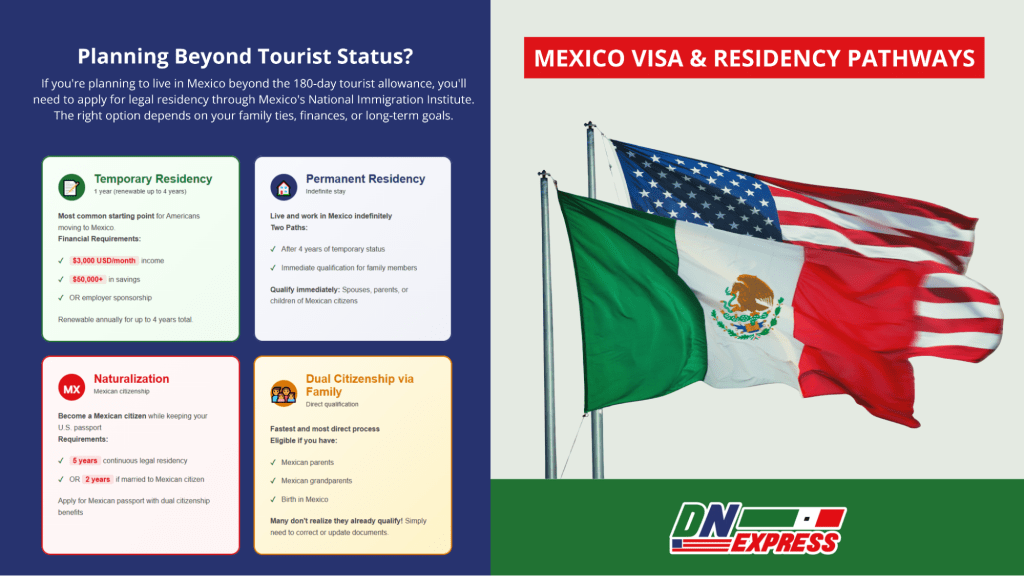
Cultural and Practical Adjustments for Expats
Living in Mexico offers rich culture, warmth, and affordability, but it also requires adjustments. The sooner you adapt to local realities, the smoother your transition will be.
Language is Key
While English is spoken in tourist zones, Spanish is necessary for daily life. From setting up utilities to building friendships, fluency reduces isolation and deepens your connection to the community.
Even basic conversational skills go a long way toward making you feel at home.
Punctuality Works Differently
Expats quickly learn about “Mexican time.” Appointments, meetings, or even social gatherings may not begin exactly on schedule.
This is not disrespect; it's cultural rhythm. Adjusting expectations will prevent frustration and help you integrate more smoothly.
Healthcare Differences
Healthcare in Mexico is both high quality and affordable, but it operates differently than in the U.S.:
- Pharmacies may stock medications with different dosages or brand names.
- Bringing a copy of your medical records is smart.
- Many expats prefer private insurance for quicker access to English-speaking doctors.
Bureaucracy, Scams, and Bribes
One of the hardest adjustments for Americans is navigating Mexico's bureaucracy. Processes can be slow, paperwork-heavy, and inconsistent from one office to another.
On top of that, scams and occasional requests for “extra fees” can overwhelm newcomers.
This is why many expats choose legal guidance for their residency or citizenship applications.
Having professionals review your documents and guide you through government processes not only saves time but also prevents costly mistakes.
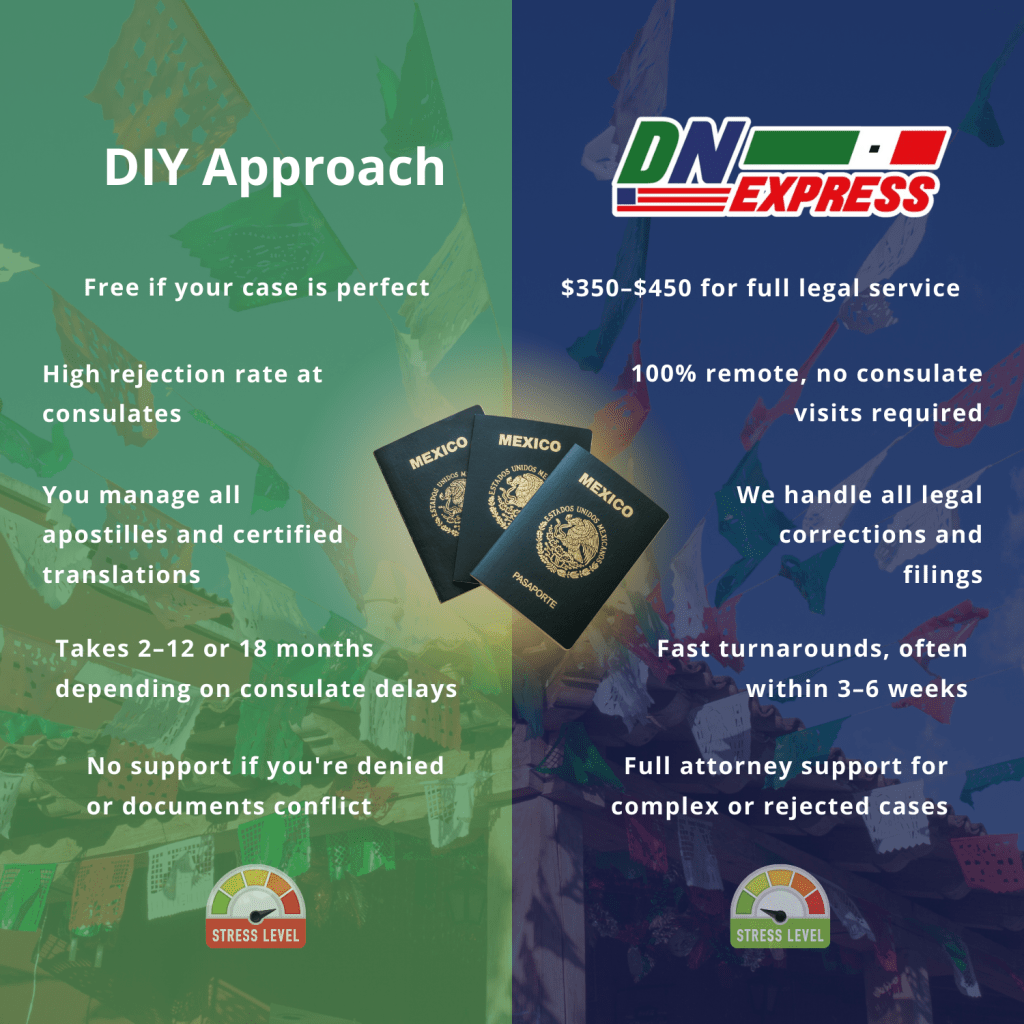
Should You DIY or Get Professional Help?
When it comes to residency or citizenship, the decision often comes down to whether you should try to handle the process yourself or work with an experienced team. Both options are possible, but they lead to very different experiences.
Downsides of Doing It Alone
At first, it may seem simple: gather paperwork, visit the consulate, and apply. But many Americans quickly find themselves stuck in long, frustrating cycles:
- Consulate wait times that stretch for months with no clear updates.
- Paperwork errors that send you back to the beginning of the process.
- Residency rules that vary by office, leaving you confused about which requirements actually apply.
- Risk of rejection if your documents, like birth certificates, CURP, or apostilles, are incomplete or contain errors.
For families, spouses, or retirees, these delays can mean missed opportunities, canceled travel, and years of uncertainty.
Why Hire Doble Nacionalidad Express
That's where we come in. Doble Nacionalidad Express has built a team of licensed binational attorneys who handle everything remotely, so you don't waste months battling bureaucracy.
Here's what we do differently:
- Document corrections: Fixing birth certificates, CURPs, and apostilles so applications are never rejected for technicalities.
- Bypassing consulate visits: Streamlining nationality processes without forcing families to wait in endless consular backlogs.
- Full legal compliance: Every application is prepared and submitted according to Mexican law, protecting you from errors.
- Proven track record: We've helped retirees secure permanent residency, spouses gain citizenship, and parents register their U.S.-born kids with dual nationality.
Most of all, we provide peace of mind. With professionals guiding the process, you won't lose sleep wondering whether the next government official will send you back to square one.
Final Takeaway
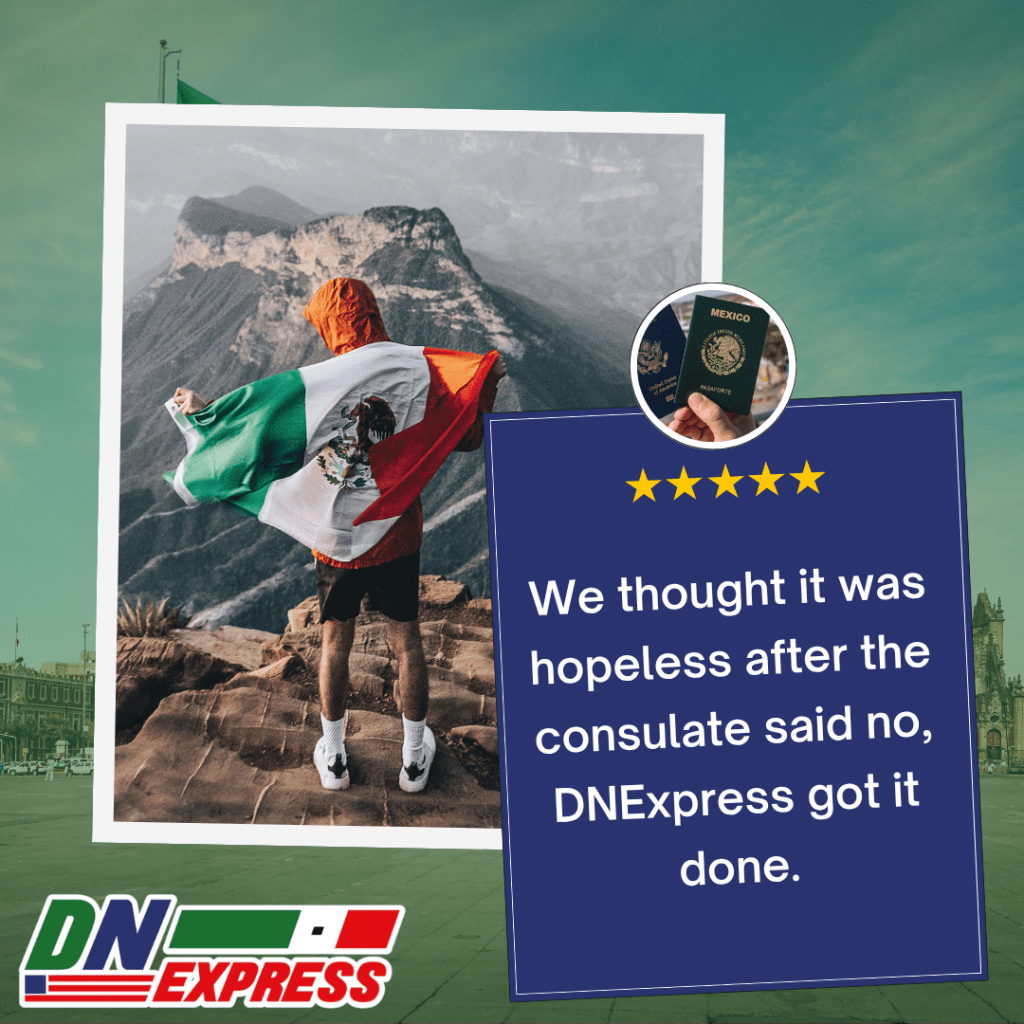
Moving to Mexico as an American extends beyond a dream; it's an achievable reality for retirees, families, spouses, and professionals alike. Whether you're reclaiming your Mexican heritage, building a future with your spouse, or seeking an affordable lifestyle, success depends on having legal clarity and the right paperwork checklist in place.
We believe no one should feel lost in the bureaucracy. From correcting documents to bypassing consulate wait times, our team makes the process smooth, legal, and stress-free, so you can focus on starting your new chapter in Mexico with confidence.
Schedule a free case review with Doble Nacionalidad Express today and take the stress out of your move. Your journey to dual citizenship and life in Mexico starts here.
FAQs Answered Clearly
Even after learning the basics, most Americans still have a few burning questions about moving to Mexico. Here are clear, straightforward answers to the ones we hear most often.
Can a U.S. Citizen Move to Mexico?
Yes, but only short-term. U.S. citizens can enter Mexico as tourists for up to 180 days without a visa.
If you want to stay longer, you'll need to apply for temporary or permanent residency.
Is It Hard to Relocate to Mexico?
Not if you qualify through the right pathway. Family ties (such as Mexican parents or a Mexican spouse) simplify the process significantly.
For others, meeting financial solvency requirements or securing an employer-sponsored visa makes relocation very achievable.
What Is the Easiest Country to Move to from the U.S.?
Mexico is widely considered the easiest option. Its geographic proximity, strong cultural and family ties, and streamlined family-based pathways make it accessible for Americans seeking residency or citizenship.
Does Mexico Have a Digital Nomad Visa?
Currently, Mexico does not offer a formal digital nomad visa. Remote workers typically use the Temporary Residency Visa as their legal framework.
While it works well for many, you'll need to meet financial requirements unless you qualify through family ties.



